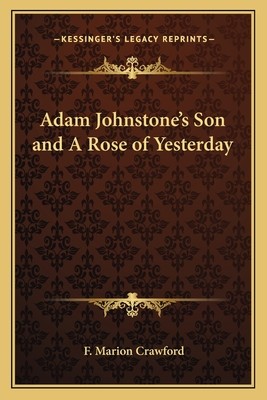
- We will send in 10–14 business days.
- Author: F Marion Crawford
- Publisher: Kessinger Publishing
- ISBN-10: 1162726709
- ISBN-13: 9781162726700
- Format: 15.2 x 22.9 x 2.6 cm, minkšti viršeliai
- Language: English
- SAVE -10% with code: EXTRA
Reviews
Description
1895. With frontispiece. F. Marion Crawford was one of the more famous authors in the English-speaking world at the time of his death in 1909. He wrote over forty novels, most of which were in the style of disposable romances popular at the time. He also wrote stories of the horror and occult, which are generally the ones for which he is remembered today. Adam Johnstone's Son begins: I sometimes think that one's past life is written in foreign language, said Mrs. Bowring, shutting the book she held, but keeping the place with one smooth, thin forefinger, while her still, blue eyes turned from her daughter's face towards the hazy hills that hemmed the sea thirty miles to the southward. When one wants to read it, one finds ever so many words which one cannot understand, and one has to look them out in a sort of unfamiliar dictionary, and try to make sense of the sentences as best one can. Only the big things are clear. A Rose of Yesterday begins: I wonder what he meant by it, said Sylvia, turning again in her chair, so that the summer light, softened and tinted by the drawn blinds, might fall upon the etching she held. See other titles by this author available from Kessinger Publishing.
EXTRA 10 % discount with code: EXTRA
The promotion ends in 21d.02:06:40
The discount code is valid when purchasing from 10 €. Discounts do not stack.
- Author: F Marion Crawford
- Publisher: Kessinger Publishing
- ISBN-10: 1162726709
- ISBN-13: 9781162726700
- Format: 15.2 x 22.9 x 2.6 cm, minkšti viršeliai
- Language: English English
1895. With frontispiece. F. Marion Crawford was one of the more famous authors in the English-speaking world at the time of his death in 1909. He wrote over forty novels, most of which were in the style of disposable romances popular at the time. He also wrote stories of the horror and occult, which are generally the ones for which he is remembered today. Adam Johnstone's Son begins: I sometimes think that one's past life is written in foreign language, said Mrs. Bowring, shutting the book she held, but keeping the place with one smooth, thin forefinger, while her still, blue eyes turned from her daughter's face towards the hazy hills that hemmed the sea thirty miles to the southward. When one wants to read it, one finds ever so many words which one cannot understand, and one has to look them out in a sort of unfamiliar dictionary, and try to make sense of the sentences as best one can. Only the big things are clear. A Rose of Yesterday begins: I wonder what he meant by it, said Sylvia, turning again in her chair, so that the summer light, softened and tinted by the drawn blinds, might fall upon the etching she held. See other titles by this author available from Kessinger Publishing.


Reviews